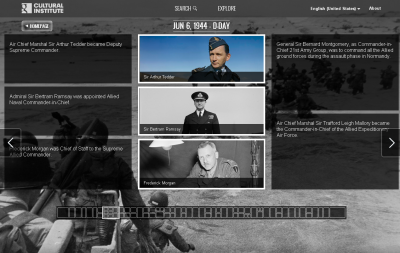With History Week kicking off in Victoria today seems like the perfect time to take a look at the new Google Cultural Institute. The project brings together a number of historical and cultural resources from cultural institutions around the world. The site features a range of digitised items, curated timelines and a number of interesting digital projects.
The Cultural Institute features resources from institutions such as the Nelson Mandela Centre of Memory and Anne Frank House, along with photographic archives from organisations like Life and Getty Images. You can select the institution or decade you are interested in by clicking on the Explore button. Context is provided to many of the digitised items in the form of curated timelines produced by the relevant institutions. A great example of this is the Imperial War Museum’s D-Day timeline.
The site also brings together a number of digital projects that you may already seen, such as the Google Art Project or World Wonders (with streetview images of the Great Barrier Reef and Scott’s Hut). A particular favourite with library staff has been the Versailles 3D project, where you can help Louis XIV build his palace.
While the curated timelines and digital projects offer a great deal of value, you can also browse archives using a general search term. Items can be narrowed down with a date slider and modified by topics such as place, event or object type. It’s a similar process to a standard Google search and may suggest that soon the Cultural Institute will be a standard Google search option in the same way News, Images and Video are now.
It’s clear that Google aims for the Cultural Institute to become a repository for a range of artefacts from across the world, moving items from individual websites to a single archive. It is an interesting move to try and create a place where all cultural material can be stored and seems to continue Google’s attempts to position themselves as the holders of culture and knowledge (as they are also doing with their book scanning project). Whether their lofty ambitions are successful remains to be seen, while some may again call into question the true motivations of the company. But for the moment there is no doubt that the Cultural Institute is a useful site and well worth exploring.

